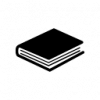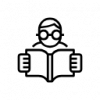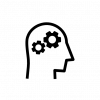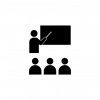I have played a key role in enhancing teaching and assessment quality at School, Faculty, and University levels, as well as in Professional Bodies.
Examples of my key innovations are:
A. Integrated online formative assessments with feedback
- One of the major challenges for University programs is to provide timely feedback to students on their learning. For that reason, I am passionate about the importance of formative assessment, and have pioneered web-based assessments of this type at UNSW for more than 15 years.
- Since 2003, I have conceived, created, implemented and evaluated integrated online formative assessments in the biomedical sciences within the Medicine program. In doing so, I have developed a body of work that encompasses nine assessments with automated feedback, each embedded within a specific Phase 1 Medicine course. This group of assessments now forms the cornerstone of feedback to students in Phase 1 Medicine at UNSW, and have significant impact on learning (Velan et al., 2008).
- My expertise and experience in developing online formative assessments has been sought by professional bodies (RCPA), international Departments of Pathology and at UNSW by Schools within Medicine, as well as other Faculties.
- For example, I was invited to lead the design of online formative assessments in large undergraduate Physiology courses at UNSW (350-400 students per semester), which resulted in identification of students at risk of failure and improved learning outcomes. The results of this intervention have been published in an international journal (Marden et al., 2013).
B. Virtual microscopy adaptive tutorials (VMATs)
- Microscopy is a key component of learning in Pathology and several other disciplines in Medicine, but many students find interpretation problematic, while large practical class sizes make it impossible for demonstrators to assist all students with difficulties.
- In collaboration with staff and research students in the School of Computer Science and Engineering (and now the commercial entity Smart Sparrow), I initiated the development of software that enables the development and deployment of online virtual microscopy adaptive tutorials (VMATs) in Pathology.
- Utilising that software, I created a suite of VMATs, which are embedded in blended learning practical classes in Phase 1 and Phase 2 Medicine. These tutorials allow students to interact with macroscopic and microscopic images of diseased tissue, have demonstrated impact on learning (Velan et al., 2009) and are crucial to provide feedback on learning by students in the Medicine program.
- In 2014, employing this technology I led the development and implementation of ground-breaking online summative practical examinations for Phase 1 Medicine, which improve reliability and efficiency of assessment (saving 40 hours of academics’ time per iteration), as well as facilitating provision of feedback to students (please see a recorded webinar below for details).
- My VMATs have been adopted for use by other Australian universities (Monash, Canberra and James Cook) and my expertise in this area has been sought by staff at UNSW band other Australian universities.
C. Online Testable Concept/Knowledge Maps
- I led the development of novel testable online concept maps with automated feedback, which have been integrated into the curriculum for Phase 1 and Phase 2 Medicine, and which have had a significant impact on learning (Ho et al., 2014).
- In 2015-2016, utilising a UNSW Learning and Teaching Innovation Grant, I led the development of a novel system for online automated assessment and feedback on knowledge maps. This system has been piloted with Medicine and Medical Science students, resulting in significant improvement in students’ perceived understanding of complex concepts.
- The resulting Knowledge Maps software is now available for widespread use at UNSW as a tool for learning and assessment, integrated with Moodle.
D. Team-Based Learning
- In 2010, in order to build student learning communities, I led the implementation of Team-Based Learning in a Pathology course for Medical Science students, and demonstrated that this approach enhanced learning by students at risk of failure.
- I subsequently led the dissemination of Team-Based Learning in all Pathology courses. This approach has been adopted by other Departments within SoMS.
E. Massive Open Online Courses (MOOCs)
- I was invited to contribute to the design and development of UNSW Medicine's MOOC (2015) titled ‘Personalised Medicine’. My leadership in online formative assessment and eLearning has been recognised in an invited video case study in the UNSW MOOC ‘Learning to Teach Online’.




